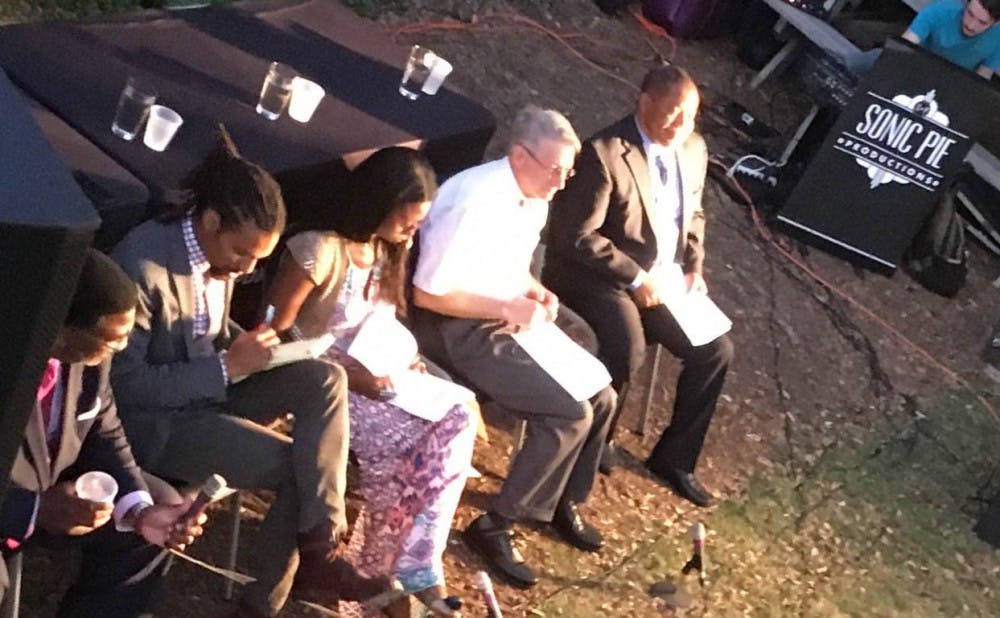Affordable housing has been a major topic in the race to succeed Durham Mayor Bill Bell. On Wednesday evening, five mayoral candidates outlined how they would tackle the issue if elected.
The forum, which is the second in the Mayor Up! Series, drew a packed crowd at Ponysaurus Brewing Co. in downtown Durham. The candidates in attendance included Farad Ali, a business consultant and former city council member, Steve Schewel, a Durham city council member and a visiting assistant professor at the Sanford School of Public Policy, Pierce Freelon, a hip hop artist and African American Studies professor at UNC, Sylvester Williams, a local pastor and former financial analyst, and Shea Ramirez, a tax preparer and entrepreneur.
There are two more events left in the Mayor Up! Series, with a discussion about equality of opportunity Oct. 4 and a post-primary debate Nov. 1.
Here are some of the points each candidate highlighted in their comments Wednesday.
Farad Ali
Ali noted that his experience in banking and economic development has informed his viewpoint on the issue of affordable housing, emphasizing the connection between living-wage jobs and housing. He explained that the city’s financial input alone is not sufficient to address the issue holistically.
“$5.5 million of housing money is not enough,” Ali said. “I think we need to create a housing trust fund [so] that we can leverage the dollars of corporations, private investors and the city dollars and even ask the county to participate so we can take that money and elevate it.”
Ali added that Durham should issue bonds to support affordable housing efforts in the city, but noted that bonds would necessitate specific goals around where that money would go. He suggested that the city focus on transportation, personal development and a range of housing styles in order to best accommodate the needs Durham residents face.
Steve Schewel
Schewel explained that half of people in Durham are "housing burdened"—meaning they spend at least a third of their income on housing.
He said that one of his main priorities is supporting the Durham Housing Authority in its “massive” redevelopment efforts. He also noted that he wants to continue the successes that Durham has already seen in affordable housing, such as through programs that include support for veterans.
Other alternatives Schewel suggested for tackling the pressing issue included making publicly owned land downtown available for affordable housing development, creative pipeline projects that will compete for the state’s nine percent tax credits and then using the savings from the tax credits to fund more affordable housing.
Pierce Freelon
From his opening statement, Freelon challenged the crowd to hold the candidates who have served on Durham City Council—Schewel and Ali—accountable for the level of housing affordability in the city.
"If you're comfortable with the status quo, there are some candidates you can choose from—and I'm not one of them," he said.
Freelon discussed the link between a lack of affordable housing and the cycle of generational poverty, noting that city leaders could decrease the demand for affordable housing by creating living-wage jobs with benefits. Freelon also said that he is open to innovative ideas—such as building more small homes.
"If we don't address poverty, [affordable housing] will be a problem that continues to plague our communities," Freelon said.
Shea Ramirez
Although North Carolina prohibits cities from mandating developers to set aside a specific number of affordable housing units, Ramirez said she would still like to see a mandate. She said that she has observed a greater level of homelessness in recent years, a trend which she described as concerning.
“We [currently] do not hold people accountable,” Ramirez said. “We have to make this a priority.”
Ramirez also said that affordable housing intersects with issues of public safety—noting that the city should support more affordable options. However, in doing so the city will have to make sure that those options are safe places to live.
Sylvester Williams
In his remarks, Williams expressed discontent with the current level of accountability for how public officials have treated the affordable housing issue in the past.
“We can’t face what we’re doing to people because we can’t look in the mirror,” he said. “It’s time to start looking in the mirror and stating what is it that we’re doing to the city of Durham.”
Throughout the night, Williams repeated the phrase “follow the money trail”—urging undecided voters to weigh the impacts of re-development and whether funding has been spent equitably.
Get The Chronicle straight to your inbox
Signup for our weekly newsletter. Cancel at any time.

